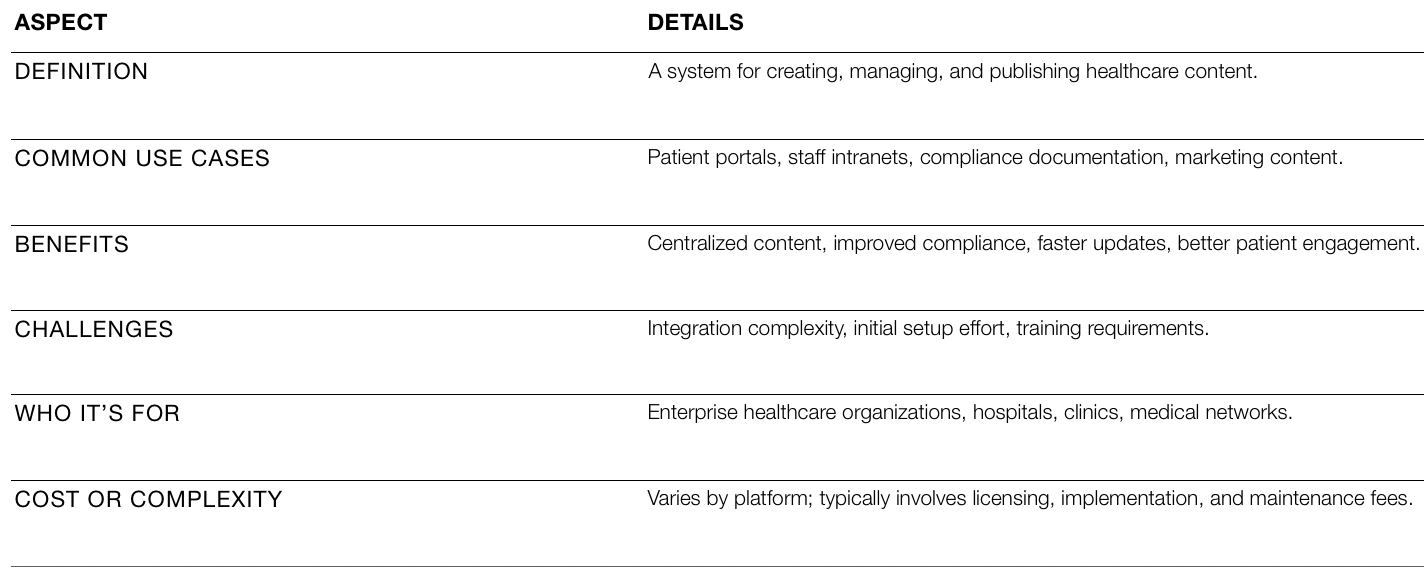
Healthcare CMS FAQs: What Is CMS in Healthcare?
Healthcare organizations face growing pressure to deliver timely, accurate, and personalized content across multiple channels. Choosing the right content management system (CMS) can be confusing, with many misconceptions about what CMS healthcare platforms can actually do.
This article explains what CMS is in healthcare, its role, and how it supports enterprise organizations. Directors, SVPs, VPs, and Heads at large healthcare companies will gain clarity on selecting the right healthcare CMS and understanding its benefits. By the end, readers will know how to evaluate CMS options and make informed decisions for their digital strategy.
Market Context: Disruption & Opportunity
Healthcare is undergoing rapid digital transformation. Many organizations struggle with outdated content systems, inconsistent patient communication, and fragmented data across departments. A modern healthcare CMS provides the foundation to unify content, streamline workflows, and enhance the patient experience.
With growing regulatory demands and the need for personalized engagement, the role of CMS in healthcare is more critical than ever. Organizations that adopt the right CMS can improve operational efficiency, maintain compliance, and deliver timely information to patients and staff.
FAQs Snapshot

What is CMS in healthcare?
CMS in healthcare refers to a content management system specifically designed to manage digital content for healthcare organizations. It helps hospitals, clinics, and medical networks create, update, and publish content efficiently across multiple channels. CMS healthcare platforms often include features like patient portals, secure document management, and workflow automation.
What does CMS stand for in healthcare?
CMS stands for Content Management System in healthcare. It is software that enables healthcare organizations to manage digital content, ensuring accuracy, security, and accessibility for both staff and patients.
What is the role of CMS in healthcare?
The role of CMS in healthcare is to centralize content management, support compliance with regulations, and improve communication with patients and staff. CMS for healthcare helps reduce errors, save time, and create consistent messaging across digital touchpoints.
Why do healthcare organizations need a CMS?
Healthcare organizations need a CMS to organize content efficiently, maintain compliance, and deliver accurate information to patients. Without a healthcare CMS, organizations risk inconsistent messaging, duplication of work, and delays in publishing updates.
What is the best CMS for healthcare?
The best CMS for healthcare depends on the organization’s size, workflow needs, and integration requirements. Leading platforms offer secure content management, role-based access, scalability, and patient-facing features. Evaluating healthcare CMS options ensures the system aligns with organizational goals.
Can CMS scale with my healthcare organization?
Yes. A modern healthcare CMS can scale to support multiple sites, departments, and patient portals. CMS in healthcare is designed to grow with the organization while maintaining performance, security, and ease of management.
How does CMS healthcare improve patient engagement?
CMS healthcare improves patient engagement by enabling personalized content delivery, easy access to resources, and consistent communication. It also supports analytics to measure content performance and patient interaction.
Benefits of Healthcare CMS
Healthcare organizations gain several advantages from adopting a CMS. A healthcare CMS centralizes content, reduces duplication, and ensures regulatory compliance. It also streamlines workflows, allowing staff to update information quickly and accurately.
Specifically, CMS healthcare improves patient communication by providing secure portals, supports marketing and education initiatives with dynamic content, and enhances collaboration across departments. Organizations experience faster content deployment, reduced administrative errors, and a more consistent brand presence. A robust CMS for healthcare also enables reporting and analytics to optimize content performance over time.
Quick Summary Table

Let’s kickstart the conversation and design stuff people will love.

Deep-Dive Sections

What It Is & Why It Matters
CMS in healthcare is software that organizes digital content for healthcare organizations. It matters because it ensures accuracy, security, and accessibility, which are critical in medical environments. Organizations that implement a healthcare CMS can provide timely information to patients and staff while maintaining regulatory compliance.
How It Works
A healthcare CMS allows content creation, editing, and publishing through a centralized interface. Staff can assign roles, schedule updates, and track changes. Many CMS for healthcare also integrate with electronic health records (EHRs) and other enterprise systems to ensure data consistency.
When to Use It (and When Not To)
Healthcare organizations should use a CMS when managing multiple digital channels, needing compliance control, or aiming to improve patient engagement. A CMS may not be necessary for very small clinics with limited digital content needs.
Tools or Platforms Involved
Popular healthcare CMS platforms include Sitecore, Drupal, WordPress with HIPAA-compliant configurations, and Adobe Experience Manager. These tools offer secure management, workflow automation, and integration with third-party healthcare applications.
Cost Considerations
Costs vary by platform, user volume, and required features. Licensing, setup, and maintenance fees are typical. Organizations must balance upfront investment with long-term efficiency and patient engagement benefits.
Integration or Setup Requirements
A healthcare CMS often requires integration with existing EHRs, marketing systems, and analytics platforms. Setup involves configuring workflows, assigning user roles, and ensuring security and compliance standards.
Scalability & Flexibility
Healthcare CMS platforms are scalable, supporting multiple sites, departments, and digital channels. Flexibility allows organizations to adapt content delivery strategies as patient and operational needs change.
Alternatives or Comparisons
Alternatives include custom-built content systems or simpler website editors. However, these options often lack scalability, compliance features, and workflow automation that a dedicated healthcare CMS provides.
Trends
Trends in CMS and healthcare include AI-driven personalization, mobile-first content strategies, and advanced analytics for patient engagement. Organizations increasingly prioritize secure, integrated CMS platforms.
Pros and Cons
Pros: centralized management, regulatory compliance, improved patient engagement, workflow efficiency.
Cons: initial implementation complexity, training requirements, potential integration challenges.
How G&Co. Can Help

G&Co. helps healthcare organizations select, implement, and optimize CMS healthcare platforms. We provide strategic consulting, integration support, and operational guidance. Our team brings real-world experience solving CMS challenges for enterprise clients. Talk to us to clarify your strategy and move forward with confidence.
Conclusion & Next Steps
This article clarified what is CMS in healthcare, its role, and how to evaluate and implement it. Enterprise healthcare leaders now understand the key considerations for selecting the best CMS for healthcare organizations.
At G&Co., we’ve worked alongside clients to implement similar shifts—whether through digital strategy, patient experience redesign, or platform modernization. Our expertise enables brands to translate trend awareness into tangible market advantage.
Still have questions? Reach out and let’s solve them together.






%20(1).png)




